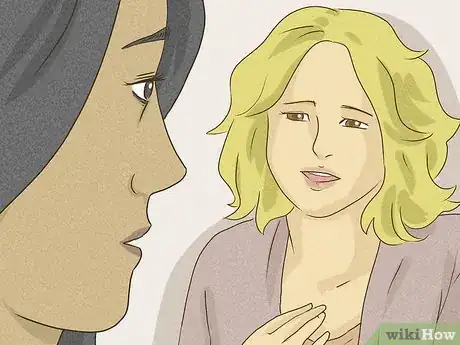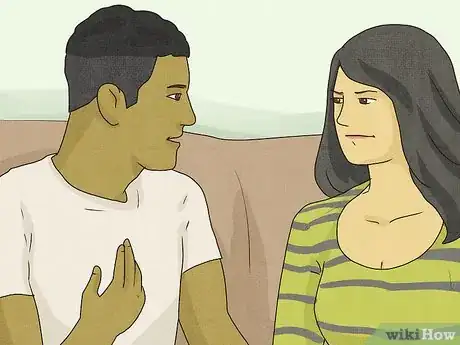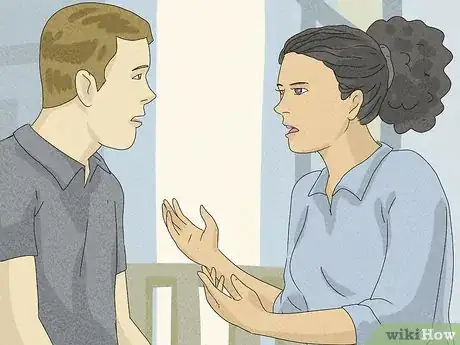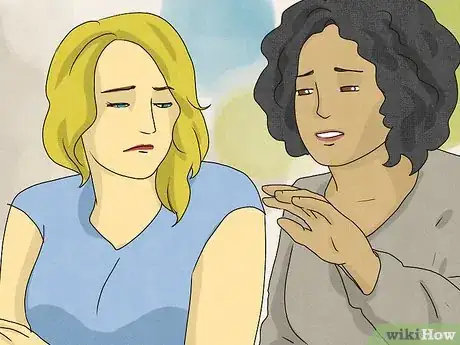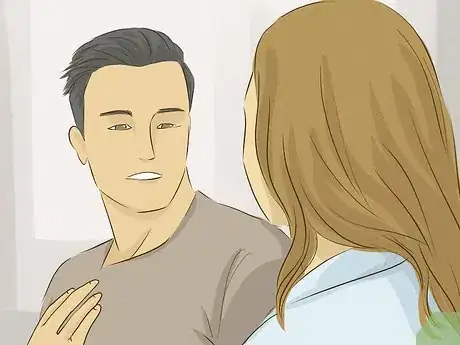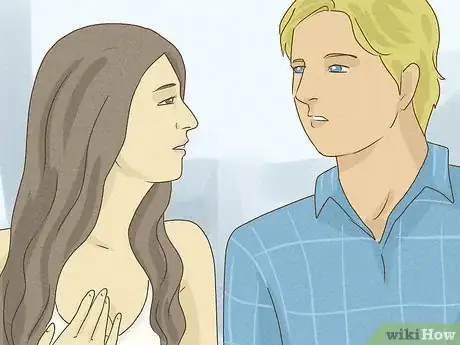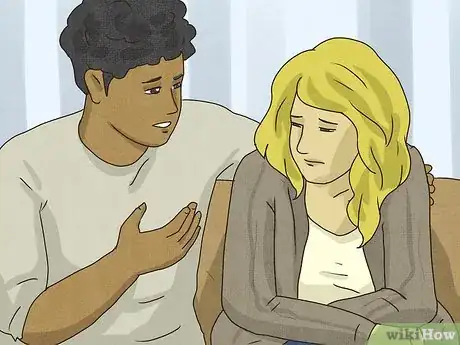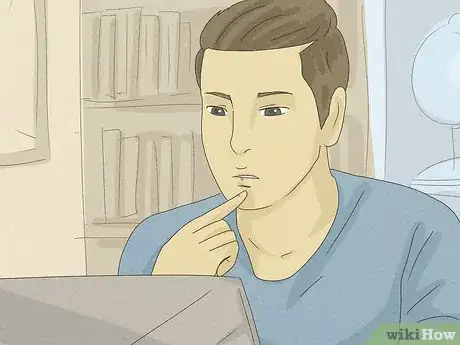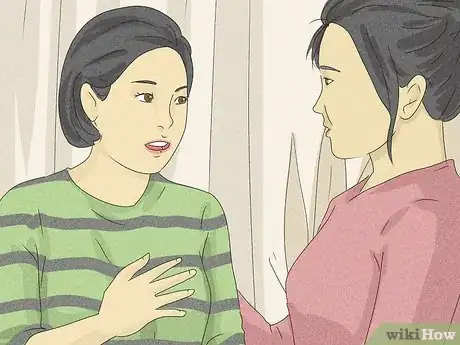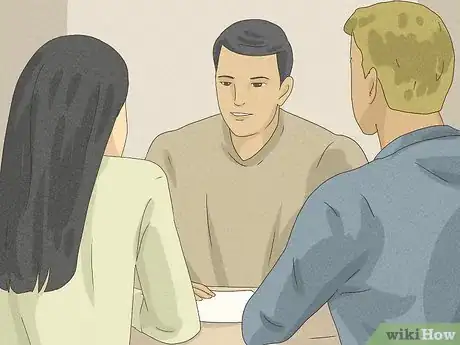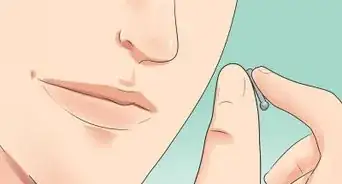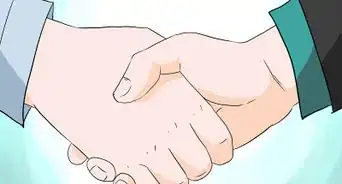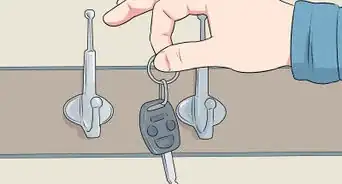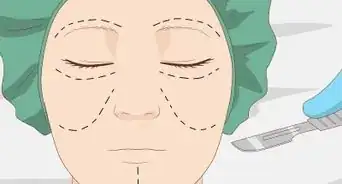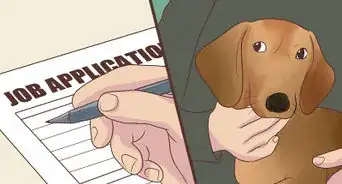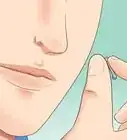This article was co-authored by Tara Vossenkemper, PhD, LPC. Dr. Tara Vossenkemper is a Licensed Professional Counselor and the Founder and Managing Director of The Counseling Hub, LLC, a group counseling practice located in Columbia, Missouri. She is also the Founder of and a Business Consultant with Tara Vossenkemper Consulting, LLC, a consulting service for therapy practice owners. With over nine years of experience, she specializes in using the Gottman Method of relationship therapy with couples on the brink of divorce, who have conflict, or who feel disconnected from one another. Dr. Vossenkemper holds a BA in Psychology from The University of Missouri, Saint Louis, an MA in Counseling from Missouri Baptist University, and a PhD in Counselor Education and Supervision from The University of Missouri, Saint Louis. She has also completed Level 3 training in the Gottman Method Couples Therapy approach and has been formally trained in both the Prepare-Enrich Premarital Couples Counseling approach and the PREP Approach for couples counseling.
There are 7 references cited in this article, which can be found at the bottom of the page.
This article has been viewed 27,964 times.
Most couples have problems from time to time. If you and your partner are having trouble in your relationship, you may consider going to couples counseling. If you want help working through your issues, learn new ways to talk to each other, and pinpoint what the root of your problems are, you can attend couples counseling.
Steps
Working Through Your Problems
-
1Be honest with yourself and your partner. You need to approach couples therapy with an open mind and honesty.[1] Your couples counseling sessions will begin with your counselor asking a series of questions to figure out where your relationship is. Your counselor will ask about your history as a couple, why you sought treatment, and other questions to see where you are as a couple.[2]
- Make sure you get everything out on the table about your relationship. Express any grievances or issues that you've had with your partner so you can figure out which problems you need to address.
- If you think you are losing yourself in the relationship and consider that to be a problem, you could talk to your counselor and your significant other about that, as well.
-
2Figure out what your main problems are. Since you and your partner have opted to go to couples therapy, you may know some of the problems that you have as a couple and these will come out pretty easily. However, there may also be other problems you are not even aware of. Work with your counselor to figure out every problem that you and your partner have.[3]
- This will help you get at any underlying issues that have led to your problems as well.
-
3Improve your communication. While working through your problems, your counselor will help you work out how to better communicate with each other so you can get past these problems and move ahead in your relationship. Your counselor will coach you in how to change the way you speak to each other in more productive and supportive ways.[4]
- Your counselor will also help you and your partner figure out which ways are the best for you two to communicate.
- For example, if you and your partner have avoided conflict with each other in the past, your counselor will help you communicate honestly about your issues without keeping things bottled up.
- If you and your partner have resorted to constant criticism of each other, your counselor will help you learn to communicate your feelings with positive, supportive language.
-
4Don't be afraid of silence. When you first go to counseling, it may take some time for you and your partner to start talking to each other. Your counselor will help you figure out how to start talking about your problems in a productive way instead of suffering in silence. These silences may be filled with anger or sadness, depending on what problems you are trying to deal with.
- These times can be used to listen to your partner or for your to start talking honestly with your partner about how you are feeling.
-
5Expect to yell or fight. Once you and your partner start working through your problems, old feelings are likely to come up. You will likely get angry, upset, or hurt when these problems come out. Expect to yell and fight with your partner. Your counselor will be there to be the mediator and help you figure out how to move past these fights and hurt feelings.
- This can be a cathartic experience because you are able to get all the pent up feelings out in the open so you can move past them.
Shifting Your Relationship
-
1Change your approach to your relationship. Your counselor will help your shift the way you think about your relationship while in couples counseling. This will help you get to a place where you no longer blame each other for problems, see where your partner is coming from, and see your relationship in an objective manner.[5]
- Your counselor will watch the way you and your partner interact in order come up with ways to bridge the gap between you and help you get to a place of mutual understanding.
- For example, if you are having communication issues, your counselor will figure out where you are lacking in that area and give you ways to overcome the barriers.
-
2Modify behaviors towards one another. In many couples, your problems can make you change the way you behave with each other. This can lead to even more problems. Your counselor will help you examine the current behavior patterns between you and your partner and give you ways to change them to be more productive and loving.[6]
- This can help you stop causing emotional or harm to you and your partner.
-
3Learn to express your emotions. When you are working through your problems with your partner, your counselor will help you figure out a way to express your honest emotions with each other. If you stop connecting with your partner emotionally, you will continue to have problems and grow farther apart.[7]
- Your counselor will also help you figure out if you or your partner have any underlying issues that can cause emotional distance, such as fear of rejection, insecurity, or unwillingness to accept attachment.
- Your counselor will help each of your work past these underlying issues and figure out how to grow closer as a couple.
- This will help you learn to be more emotionally intimate with each other. Emotional intimacy focuses on being mutually vulnerable and open with each other through sharing your feelings in an honest, real way.[8]
-
4Figure out your strengths as a couple. As your couples counseling draws closer to its end, you will have worked past most of your issues. At this point, your counselor will begin to focus on the strengths you have as a couple. This will help you realize how resilient your relationship can be and how much the two of you can endure. This will help you focus on the good things about each other and on the pleasure you can derive from your relationship.[9]
- This is usually a welcome change from all the focus on your problems as a couple.
- Your counselor may focus on things you do to compliment each other or ways in which you emotionally support one another within your relationship.
Preparing for Couples Counseling
-
1Recognize if you need couples counseling. Couples counseling can be attended by anyone in a romantic relationship. Although some go to couples counseling before marriage to make sure their relationship is at the right place for the next step, it is typically for those couples who having issues within the relationship that they need outside help fixing. Often, those that attend couples counseling are working through problems that may lead to separation or a divorce/breakup, such as:
- Infidelity
- Sexual dissatisfaction
- Communication issues
- Power struggles
- Betrayal
- Anger
- Issues with child bearing, rearing, or blended families
- Substance abuse
- Financial issues
-
2Accept that you need counseling. One of the most important things you can do before you go to couples counseling is accept that you and your partner need help. This needs to be done by both of you. If your partner is not willing to go to counseling, then you can still go on your own and benefit from therapy. It might just be harder to improve your relationship this way.
- Accepting that you need help does not mean failure. It means that you understand that you and your partner care enough about each other to work on your relationship and need a little help to figure everything out.
- You should also be committed to making your relationship work. If you don't allow yourself to be open to fixing your relationship, you will not be able to fully participate in counseling.
-
3Know what to expect from couples counseling. Couples counseling is a method of talk therapy that focuses on your relationship with your partner. You will work with your counselor to express emotions, get closer, and work through your relationship issues. You will also decide whether or not you can move past your issues and if you can save your relationship.
- You and your partner will talk through your problems with the help of your counselor, where he or she will lead you and your partner in the right direction to heal.
- Although the sessions will focus on you and your partner as a couple, you will also be able to complete some individual sessions if desired.[10]
-
4Find a licensed counselor. Once you decide that you need couples counseling, you need to find a licensed counselor in your area. You can ask your doctor for a referral to a good therapist. You can also ask your family or friends, look into those covered by your insurance provider or employee assistance programs, or do research into local and state mental health agencies for help to find a good counselor.
- There are some insurances that will pay for counseling session. You can check with your insurance and you can also ask the therapist how much he or she charges for each session.[11]
-
5Make time in your schedule. Couples therapy usually takes place once a week and the session last about an hour. This is to ensure that you have ample time to work through your issues and talk to one another. The amount of time that you will remain in counseling will vary depending on your specific needs and depth of your issues.
- Couples counseling is often short-term, lasting from a few sessions to work through a small problem to a few months, but it will last as long as you and your partner need the help.
- Your counselor may suggest or offer additional individual counseling sessions if you have issues you need to work through on your own. These will be scheduled at a different time.[12]
Expert Q&A
-
QuestionHow do I tell my partner I want to see a therapist?
 Tara Vossenkemper, PhD, LPCDr. Tara Vossenkemper is a Licensed Professional Counselor and the Founder and Managing Director of The Counseling Hub, LLC, a group counseling practice located in Columbia, Missouri. She is also the Founder of and a Business Consultant with Tara Vossenkemper Consulting, LLC, a consulting service for therapy practice owners. With over nine years of experience, she specializes in using the Gottman Method of relationship therapy with couples on the brink of divorce, who have conflict, or who feel disconnected from one another. Dr. Vossenkemper holds a BA in Psychology from The University of Missouri, Saint Louis, an MA in Counseling from Missouri Baptist University, and a PhD in Counselor Education and Supervision from The University of Missouri, Saint Louis. She has also completed Level 3 training in the Gottman Method Couples Therapy approach and has been formally trained in both the Prepare-Enrich Premarital Couples Counseling approach and the PREP Approach for couples counseling.
Tara Vossenkemper, PhD, LPCDr. Tara Vossenkemper is a Licensed Professional Counselor and the Founder and Managing Director of The Counseling Hub, LLC, a group counseling practice located in Columbia, Missouri. She is also the Founder of and a Business Consultant with Tara Vossenkemper Consulting, LLC, a consulting service for therapy practice owners. With over nine years of experience, she specializes in using the Gottman Method of relationship therapy with couples on the brink of divorce, who have conflict, or who feel disconnected from one another. Dr. Vossenkemper holds a BA in Psychology from The University of Missouri, Saint Louis, an MA in Counseling from Missouri Baptist University, and a PhD in Counselor Education and Supervision from The University of Missouri, Saint Louis. She has also completed Level 3 training in the Gottman Method Couples Therapy approach and has been formally trained in both the Prepare-Enrich Premarital Couples Counseling approach and the PREP Approach for couples counseling.
Licensed Professional Counselor Remember that this is not a big deal and make sure they understand that the couple's therapy goal is to figure out issues and help both partners improve, not to point fingers and accuse one another.
Remember that this is not a big deal and make sure they understand that the couple's therapy goal is to figure out issues and help both partners improve, not to point fingers and accuse one another. -
QuestionCan couples counseling make things worse?
 Tara Vossenkemper, PhD, LPCDr. Tara Vossenkemper is a Licensed Professional Counselor and the Founder and Managing Director of The Counseling Hub, LLC, a group counseling practice located in Columbia, Missouri. She is also the Founder of and a Business Consultant with Tara Vossenkemper Consulting, LLC, a consulting service for therapy practice owners. With over nine years of experience, she specializes in using the Gottman Method of relationship therapy with couples on the brink of divorce, who have conflict, or who feel disconnected from one another. Dr. Vossenkemper holds a BA in Psychology from The University of Missouri, Saint Louis, an MA in Counseling from Missouri Baptist University, and a PhD in Counselor Education and Supervision from The University of Missouri, Saint Louis. She has also completed Level 3 training in the Gottman Method Couples Therapy approach and has been formally trained in both the Prepare-Enrich Premarital Couples Counseling approach and the PREP Approach for couples counseling.
Tara Vossenkemper, PhD, LPCDr. Tara Vossenkemper is a Licensed Professional Counselor and the Founder and Managing Director of The Counseling Hub, LLC, a group counseling practice located in Columbia, Missouri. She is also the Founder of and a Business Consultant with Tara Vossenkemper Consulting, LLC, a consulting service for therapy practice owners. With over nine years of experience, she specializes in using the Gottman Method of relationship therapy with couples on the brink of divorce, who have conflict, or who feel disconnected from one another. Dr. Vossenkemper holds a BA in Psychology from The University of Missouri, Saint Louis, an MA in Counseling from Missouri Baptist University, and a PhD in Counselor Education and Supervision from The University of Missouri, Saint Louis. She has also completed Level 3 training in the Gottman Method Couples Therapy approach and has been formally trained in both the Prepare-Enrich Premarital Couples Counseling approach and the PREP Approach for couples counseling.
Licensed Professional Counselor It can, especially when the couple doesn't know how to deal with uncomfortable conversations. Remember that this discomfort is in the name of healing and that your intention is to heal and move on.
It can, especially when the couple doesn't know how to deal with uncomfortable conversations. Remember that this discomfort is in the name of healing and that your intention is to heal and move on.
References
- ↑ Tara Vossenkemper, PhD, LPC. Licensed Professional Counselor. Expert Interview. 18 January 2022.
- ↑ http://lifehacker.com/what-to-expect-from-couples-therapy-512019720
- ↑ http://www.professional-counselling.com/relationship_couple_counselling.html
- ↑ https://www.psychologytoday.com/blog/fulfillment-any-age/201203/5-principles-effective-couples-therapy
- ↑ Tara Vossenkemper, PhD, LPC. Licensed Professional Counselor. Expert Interview. 18 January 2022.
- ↑ https://www.psychologytoday.com/blog/fulfillment-any-age/201203/5-principles-effective-couples-therapy
- ↑ https://www.psychologytoday.com/blog/fulfillment-any-age/201203/5-principles-effective-couples-therapy
- ↑ http://www.goodtherapy.org/blog/psychpedia/intimacy
- ↑ https://www.psychologytoday.com/blog/fulfillment-any-age/201203/5-principles-effective-couples-therapy


